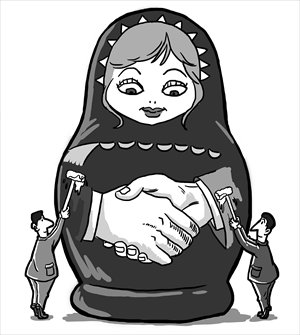HOME >> OP-ED
Can trust again build bridges across Siberia?
By Yu Bin Source:Global Times Published: 2012-8-31 0:35:05

Illustration: Sun Ying
The seventh round of Sino-Russian strategic security talks was held on August 20 in Moscow between Russian Security Council Secretary Nikolai Patrushev and Chinese State Councilor Dai Bingguo. The talks, however, were barely noticed by global media. In the wake of Vladimir Putin's return to the Kremlin and the Olympics fanfare, everything else seems trivial, if not boring.
An uncertain world
The world according to Russia and China, however, is far from serene. Syria appears on the verge of a free fall; Israel may be readying itself for a surgical attack on Iran; and Afghanistan remains unstable at best after years of fighting. Meanwhile, territorial disputes between China and some of its neighbors continue to escalate. Behind all of these disputes is the ubiquitous hand of the US.
China seems to be the primary target of Washington's strategic "rebalancing" act. Largely because of this, Dai seems more eager than his Russian counterpart to discuss mutual support in "core issues" of national sovereignty and security.
Toward a normal relationship?
For China, the deteriorating security situation in its periphery is worrisome. Many are concerned about the so-called "C"-shaped posture of the US around China, with Russia as the only significant country that is not part of Washington's strategic matrix.
As a result, many in China urge an alliance with Moscow, though there seems an equally strong counter-argument for caution.
For his part, Patrushev appeared more evasive as he talked about "consensus" on many important issues. "There is no obstacle at all to bilateral relations," remarked Patrushev. Russia's posture is understandable, as Moscow is assessing its relations with Washington. There is no question that Putin is not liked in the West but it is in Russia's interests to have a more stable relationship with Washington. This is why Putin's Russia carefully manages relations with the US: deflecting critique of Russian domestic issues, while allowing NATO supplies to go through its territories to Afghanistan and participating the US-sponsored largest-ever "Rim of the Pacific" naval exercise in July in Hawaii.
For a variety of reasons, a Sino-Russian alliance as seen in the 1950s is out of question, unless the core interests of the two are simultaneously jeopardized by a third party. This does not necessarily mean, however, the two should not cooperate strategically. If anything, the two have been working closely on issues regarding Syria, Iran, North Korea, the SCO and the BRICS.
From a historical perspective, the current Sino-Russian partnership of strategic coordination is an outcome of the two extreme types of relations the two countries have undergone in their first three decades of ties. This includes the "honeymoon" of the 1950s and the "divorce" on the 1960s and 1970s.
In the wake of these "extremes," the two sides are far more rational and pragmatic today. Such a "normal" relationship allows considerable space between the two. How to maintain such a relationship, however, requires both political wisdom and pragmatic skills at a time of fluidity in both domestic and foreign affairs.
Things to take care of
The strategic partnership relationship, however, cannot, and should not, be taken for granted. The high level of strategic trust between the two countries, for example, is yet to be translated in their economic interactions.
Similarly, Russian and Chinese people seem more interested in looking to the West than to each other.
For many Russians, the fear of Chinese "illegal" immigration to the vast and sparsely populated Siberia has been increasing. This may have been the motivation of several cases of excessive use of Russian force in dealing with Chinese "illegal" fishing. In February 2009, a Chinese cargo ship was sunk by Russia's coastal guard off the Vladivostok coast.
As such, Dai was quite vocal about the positive role played by Chinese working and living in Russia. "The two close neighbors cannot strictly separate from one another," he remarked.
President Putin met with Dai after the talk. Exactly what was discussed between Putin and Dai is yet to be revealed. The meeting nonetheless suggested that the seventh strategic talks apparently went well at a time of uncertainty for the two large Eurasian powers.
The author is senior fellow of the Shanghai Association of American Studies. yu1999@hotmail.com
Posted in: Viewpoint